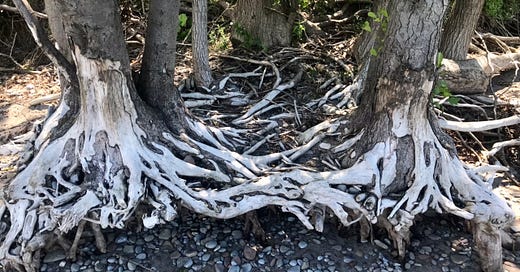“You've got to give a little, take a little,
and let your poor heart break a little.
That's the story of, that's the glory of love.”
Songwriter Billy Hill wrote these lyrics made famous by Bette Midler in the movie, Beaches. Over the past few weeks, you’ve been noticing the ongoing conversations we have with other humans and the nonhuman world. This is the juice of our lives, how we connect in relationships. In every good relationship, there’s a little give and a little take. This is called reciprocity, the subject of this week’s post.
Reciprocity implies mutual dependence, action, or influence; a mutual exchange of privileges (Merriam-Webster).
Reciprocity is the key to a good conversation and a good relationship. It makes sense to me how this works in human to human interactions. The quality of the relationship correlates with the balance of giving and taking. It’s not as clear how it works when it comes to other beings but the key is mutual respect.
David Abram on Salmon
A few months ago, I participated in a Spiritual Ecology course run by Emergence Magazine and David Abram was a guest speaker. He spoke of reciprocity as being the foundational ethic of relationships within the natural world and gave the example of salmon.
“Reciprocity, the ceaseless give and take, the flow that moves in two directions — this is the real teaching of the salmon. It is the foundation of any real ethic: give unto others as you would have them give unto you.” ~ David Abram, Reciprocity and the Salmon
I highly recommend reading Abram’s article, as he brilliantly lays out how integral the salmon are to the places they inhabit. They single-mindedly swim upstream to spawn every year to create new life and then give their bodies back to nourish the land afterwards. If their habitat is degraded, everything suffers.
A Culture of Responsibility
The world we live in is made up of interdependent systems and we interact with these systems all the time. Every being needs food and shelter and water and air and a little luck to survive. And, we need connection with the human and more than human world. It’s simply not possible to be completely independent.
Once we start noticing this interdependence, the relationships that are already there, we’ll see the places where we live in a whole new light. The beauty and the flaws become more apparent. There’s a feeling of appreciation for what’s working and an awareness of what’s broken. You feel a sense of belonging and responsibility.
As it turns out, reciprocity between humans and non-humans is out of balance. It’s not a stretch to say that we humans are an extractive species, always taking in new information, things, and experiences. We could learn a thing or two about reciprocity from the way the natural world operates.
Robin Wall Kimmerer asks, “What would happen if we shifted our culture of rights, whose narratives center on what’s mine, to a culture of responsibilities, whose narratives center on what’s ours?” We could nurture relationships of gratitude and appreciation of shared abundance. What is at stake is “the evolutionary fitness of both plant and animal.” ~ via You are Here, Whitney Phillips
Practice
This week, notice the reciprocal relationships (human and nonhuman) around you and in which you participate, and consider the following questions.
What do they have to teach you?
Which relationships are out of balance?
Where do you need to take less and give back more?
What do you feel a responsibility towards?
How do you help to repair damage and regenerate life?
How do you show appreciation for what you’re given?
How do you share the gifts you’ve been given?
Remember that you can give back in many ways, including non-material, for example, by showing appreciation and gratitude, by listening, and by caring.
In the spiritual ecology class, David Abram gave the following exercise.
“Reflect on an encounter with the more-than-human world that struck or marked you deeply at some point in your life. In what ways did this encounter open you to being a participant in a world that shares intelligence, agency and commonality? What did you receive and what did you give back?”
I wrote a post about experiencing reciprocity in Ireland.
Share an example of reciprocity in your life in the comments or with a photograph on Instagram and add the hashtag #seeingclearly2021.
Resources
David Abram, PhD, is a cultural ecologist and philosopher. He is the founder and creative director of the Alliance for Wild Ethics. His books include Becoming Animal: An Earthly Cosmology and The Spell of the Sensuous: Perception and Language in a More-than-Human World.
Sharing Life: The Ecopolitics of Reciprocity - free PDF from Andreas Weber




